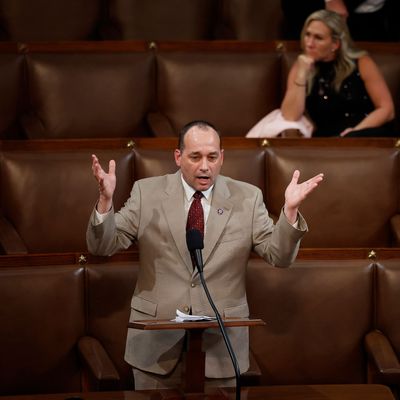
One of the more interesting things about the weeklong right-wing revolt against Kevin McCarthy’s ascent to the Speakership that has paralyzed the U.S. House has been the rebels’ conceit that they, rather than the other 414 members of the chamber, exclusively represent the “will of the American people.” They have passionately and redundantly appealed to this “will” during their remarks on the floor. A good example was Thursday’s speech by Virginia congressman Bob Good in nominating his obscure Oklahoma colleague Kevin Hern for the Speakership:
The greatest reflection of where the people of this country are is the
House of Representatives. The people spoke back on November 8 and gave the majority by some 3 or 4 million votes to the Republican Party. It’s not the White House; it’s not the Senate. It’s the People’s House that reflects where the American people are, and they trusted us on this side of the aisle with the leadership of this House. And we have a window of opportunity to validate that trust, to do whatever we can to save this Republic.
That salvation, Good continues at some length to assert, requires “transformational change” in the Republican Party and in the Congress, meaning above all no more cooperation with the White House, with House Democrats, or with either party’s leadership in the Senate, as they all represent the despised “swamp” in the MAGA imagination.
When you deconstruct this train of thought, its arrogance is pretty breathtaking. The notion that the House majority holds an exclusive popular mandate is not one that Good or any of the rebels would have embraced during the eight years that Nancy Pelosi was Speaker. As for 2022, the more than 54 million Americans who voted for House Democratic candidates are given no voice at all. And the idea that Republicans carried the House out of some frantic cry from the electorate for “transformational change” is less compelling than the entirely commonplace metronomic trend against the party controlling the White House — a trend that was, in fact, weaker than any we have seen since 2002 and among the weakest ever. And the anti-McCarthy rebels had little or nothing to do with preventing a completely catastrophic midterms outcome for Republicans. As FiveThirtyEight notes, most of them barely had to run in the 2022 general election:
Unlike the Democrats who voted against former Speaker Nancy Pelosi in 2019 — who hailed exclusively from competitive districts — McCarthy’s foes tend to come from solidly red turf. Only three of the 20 were elected in districts with FiveThirtyEight partisan leans bluer than R+15 [districts 15 points more Republican than the country as a whole].
Yes, arch-rebel Lauren Boebert won the closest House race in the country. But that’s because she very nearly lost reelection in an R+7 district, not because she was identified with “the swamp” or with Kevin McCarthy. Conversely, it’s hard to blame GOP underperformance on RINO squishes. Republicans lost the Senate thanks to unimpressive results posted by MAGA stalwarts like Blake Masters, Don Bolduc, Herschel Walker, and Adam Laxalt. If Mitch McConnell (the object of nearly as much rebel spleen as McCarthy this week) still stands athwart the Senate Republican conference like an ancient colossus, it’s because candidates who share the worldview of Bob Good and Matt Gaetz and Andy Biggs bombed at the ballot box. Closer to home, notable House flops included right-wing insurgents Joe Kent of Washington, J.R. Majewski of Ohio, and John Gibbs of Michigan.
Listening to the anti-McCarthy hardliners, you get the sense that they believe themselves to represent the popular will independently of the evidence supplied by mere elections. And that makes sense when you plumb the depths of their conspiracy-theory-laden points of view. Most of them are 2020 election deniers who are willing to discount a sizable number of votes as putatively fraudulent. Many believe leaders in both parties (along with the news media and social-media platforms) are complicit in preventing many millions of voters from making informed candidate choices. And at a time when they and other Republicans routinely accuse Democrats of socialist extremism, conservative hardliners counterintuitively continue to assert (as they have done during the Speakership fight) that there is too little difference between the two parties.
In this, the fringe characters of the political right resemble their counterparts on the left; both tend to assume there is a hidden majority for their points of view that somehow never breaks through in actual elections thanks to the perfidy of the Establishment. But let’s be clear: There’s zero equivalence in conduct. The fringe elements of the left, to the extent they exist in Congress, aren’t holding the chamber hostage; they have joined their Establishment colleagues in supporting Hakeem Jeffries for Speaker, though many consider him too “centrist.” And it’s not the left that spawned an assault on the Capitol just two years ago or whose votes to overturn the 2020 election results represented an endorsement of the rioters’ motives, if not their violent excesses. (All of the anti-McCarthy rebels then in Congress, along with McCarthy himself and a majority of House Republicans, voted against counting state-certified Biden electors.) In a very real sense, the men and women who have prevented the swearing in of the 118th Congress for so long represent not “the American people” but an anti-democratic faction that recognizes no authority but its own will to power.
More on Politics
- Trump Is Threatening to Invade Panama, Take Back Canal
- What Happened to Texas Congresswoman Kay Granger?
- Who Is Lara Trump and What’s With the Quashed Senate Rumors?






























